Student Leadership & Programs
The Biological Sciences Department encourages student participation in a variety of extracurricular and leadership activities. A first-semester freshman can get involved with the Biology community immediately through the Uplift vertical mentoring program. Upperclassmen have the opportunity to move into leadership positions. This page highlights extracurricular and leadership activities specific to the Biology Department.
Senior Leadership Committee for the Department of Biological Sciences
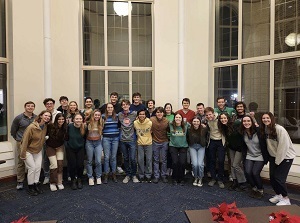
The Notre Dame Biological Sciences Senior Leadership Committee (SLC) is a group of approximately 30 Senior and Junior Biological Sciences and Environmental Sciences majors who have demonstrated leadership, service, and achievement in research and coursework.
The goals of the committee are to:
- provide feedback to the Department on curriculum, undergraduate research and career preparation for current students
- serve as leaders in freshman and sophomore mentoring programs
- recruit prospective high school students to Notre Dame and the Biology and Environmental Sciences major
- suggest new initiatives in undergraduate education in the Department
- build community within the major
Recent accomplishments have been:
-
initiating the Undergraduate Research Skills Workshop Series (each spring)
-
hosting the annual Biology Formal in Jordan Hall of Science as well as a Thanksgiving feast for Biology majors
-
reviving the DISC program after the pandemic
-
helping to curate a database of undergraduate research opportunities
-
proposing tracks within the Biology major that have been adopted by the faculty of the Department
The SLC projects are generously funded by Mr. and Mrs. Frank McDonald.
Contact: Eva Deegan (Environmental Sciences Chair), or Jimmy Twist (Biological Sciences Chair)
Uplift
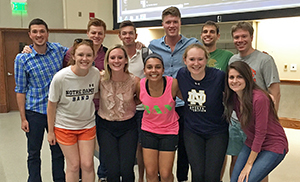
Uplift is a vertical mentoring program for biology majors in which students from all four classes are formed into small groups for community building, mentoring, and discussion. Incoming freshmen have the opportunity to join the mentoring program in the first weeks of school, facilitating the adjustment to college-level Introductory Biology.
Please feel free to reach out to Uplift with any of your questions or concerns uplift@nd.edu
Program Coordinators: Catherine Hammond, Christina Han, Amanda Waelde, Usaid Mazhar or Reed Stevens
Biology Club
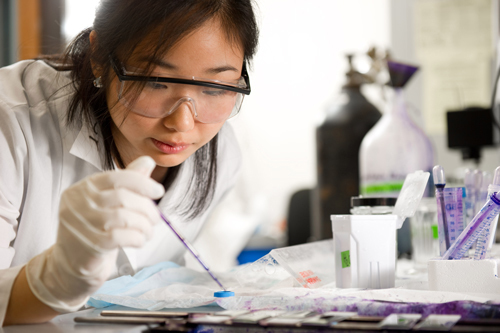
This club seeks to encourage an interest in Biology among undergraduate majors through meetings and discussion among members, events such as Science Week and the COS Formal Dance, and educational opportunities. The Biology Club coordinates fundraising events for research and hosts the annual Research Networking Dinner. Some meetings even include a drawing for a free Kaplan MCAT class. Check it out!
Contact: Biology Club Email
Teaching Opportunities
-
Teaching Assistants (Biology Lab, Genetics Lab, Genetics Lecture, or General Ecology Laboratory)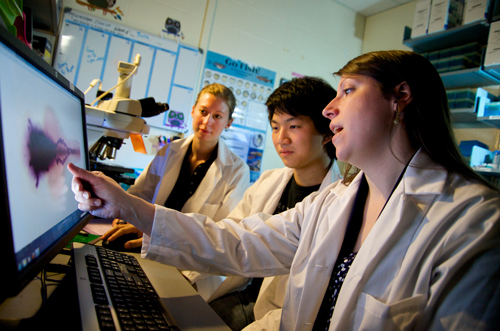
- Many opportunities are available to be an undergraduate teaching assistant (UTA) in the Department of Biological Sciences. UTAs assist graduate TAs and instructors with a variety of tasks including help ready laboratories, conducting review sessions, leading group discussions, and tutoring fellow students. Importantly, UTAs serve as a bridge between students, graduate TAs and instructor so that students gain personalized attention. Furthermore, this experience provides UTAs with valuable leadership and communication experience while developing professional skills needed for various careers. Students interested in becoming an UTA should find out more by asking instructors of courses in which they have done well and enjoyed.
- DNA Learning Center
- Learning Resource Center (LRC) Tutoring
Scientia
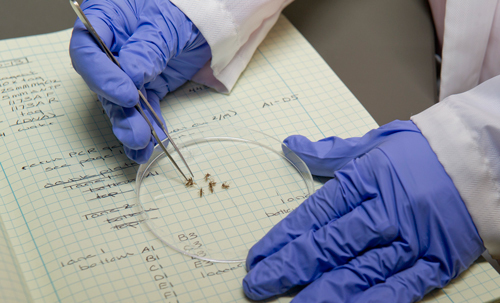
This undergraduate research journal publishes the work of current Notre Dame students in the College of Science. The organization also hosts research presentations for both undergraduates and faculty to encourage an ongoing discussion.
Contact: scientia.nd.edu
DISC
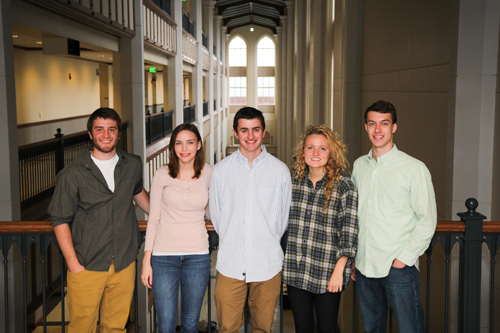
Dinners for Increased Scholarly Communication (DISC) consist of an evening of food at discussion at a Biology professor’s house. A group of 8-12 students are transported to the home, where they are provided with a nice dinner and conversation regarding research, careers, and questions related to the Biology major. The program started during the 2013-14 school year in the Biology major and has since expanded throughout the College of Science. Dinners fill quickly, so it is recommended that you sign up quickly after receiving a notification from your advisor.
Contact: Kyle McAvoy